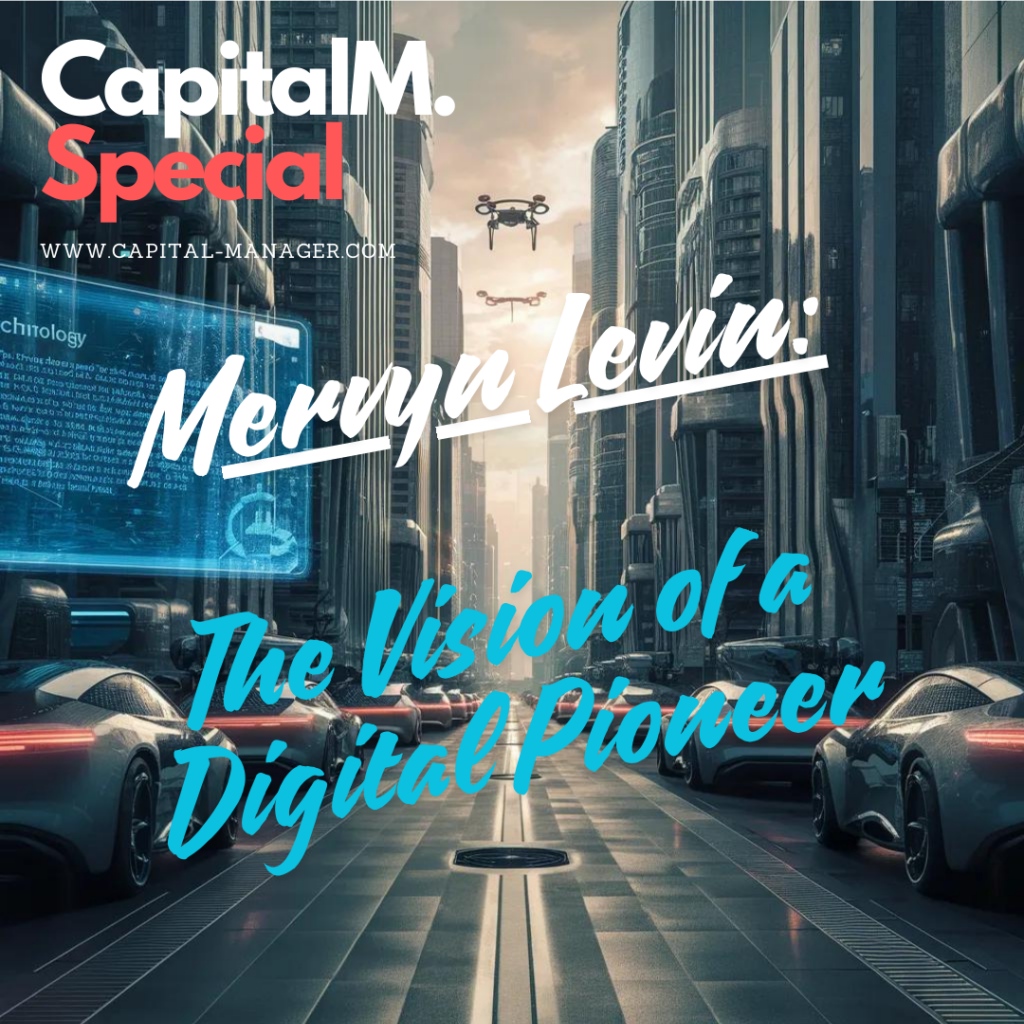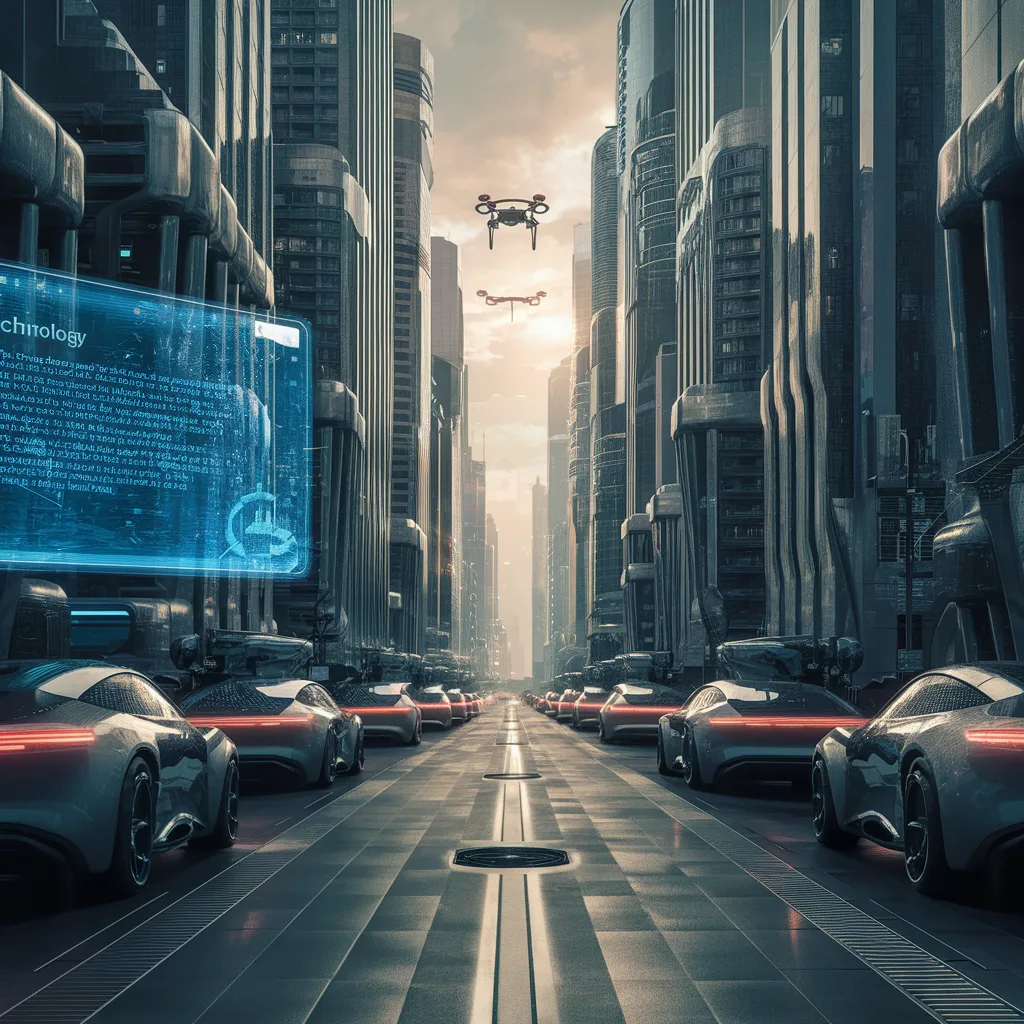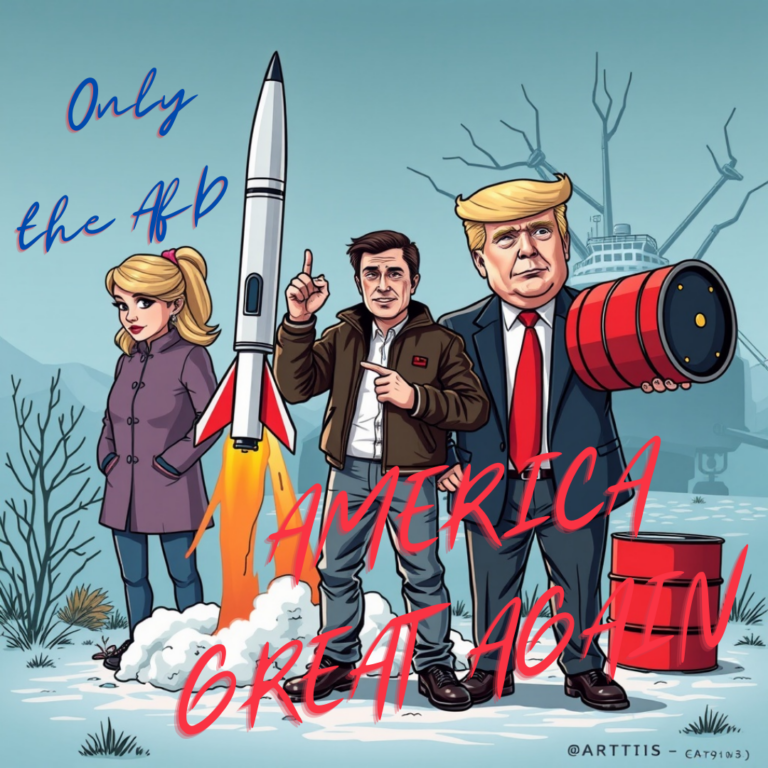Mervyn Levin, an iconic figure and thought leader in the digital economy, shares his groundbreaking insights on the transformative power of artificial intelligence. As the Founding Director of Levering Limited and strategic advisor to European innovation programs, Levin discusses how AI will shape our future, presenting both challenges and opportunities. Gain exclusive access to the mind of a man whose opinions significantly influence the tech industry.
Here is the Interview/Article and more Informations:

Mervyn Levin Founding Director, Levering Limited
I am a passionate enthusiast and champion of the digital economy.
Advances in digitisation across a wide range of sectors, disruptive business models and deep insight into the political economy of data and technology permeate my career with successful delivery at strategic, programme and project levels in fast changing environments. My consultancy, Levering Limited, has a strong interest in Artificial Intelligence, both contributing to and following policy, research and commercial developments which this interview draws upon.
I work mainly with several public sector funding programmes stimulating innovation across Europe. This includes as Vice-Chair, Rapporteur and Panellist for the European Commission’s Horizon Europe Programme, which is the world’s largest research and development programme, and the European Research Council. In the UK, I also oversee industry-led, high impact projects aligned with policy priorities for accelerating commercialisation and increasing national competitiveness.
Other current roles include mentoring SMEs for VC funders.
Also, as Honorary Research Fellow at University of Sheffield, I enable knowledge exchange with industry and deliver annual lectures on the innovation landscape, including Artificial Intelligence, to an MA post-graduate course. I am a Fellow of the UK Royal Society of Arts and have published in management and academic journals. I lived in Asia for 10 years up until 2018, doing business across all of Asia’s major economies.
My previous roles include Head of Digital Content Policy at UK’s Department of Trade and Industry (2002-7) and global management positions at Reuters, the news and financial services organisation (1980-2002).
I enjoy embedding an innovation culture in companies and facilitating viable partnerships across my extensive network.
Artificial Intelligence – the big Revolution?
Questions and Answers

Open-ai launched the first „AI“ platform. Is this the beginning of a new industrial or digital revolution?
More has happened in the last year or so of AI than the prior 10. We are undoubtedly in an exciting and somewhat also scary takeoff of the most important technology of the rest of our lives for everybody—governments, citizens, technologists, businesses. AI is starting to pervade nearly everything. The pace is accelerating.
A founding father of the US, Benjamin Franklin, famously said a few centuries ago:
“in this world nothing can be said to be certain, except death and taxes.”
Today, we should perhaps add AI’s impending transformation of our lives to that shortlist. This is disruptive change – we need to get used to it. ChatGPT reached a million users in just five days. Now there are around 400 million users in April compared to 2.4 billion users last month for WhatsApp. Similar to electricity and the internet, AI is a foundational technology with the potential to transform industries, economies and societies. Such foundational technologies quickly become embedded in daily life, spurring economic growth and facilitating new technologies and services.
Is the „AI“ really able to learn and discover a kind of science?
Yes, definitely it’s now happening.
Think of AI as one of the founding technologies on the road to Artificial General Intelligence. This is a type of artificial intelligence that will be able to understand, learn and apply knowledge across a wide range of tasks, just like a human.
Think of the concept ‘intelligent autonomy’ enabling machines to acquire enough intelligence to collaborate semi-autonomously with humans under some human agency and oversight. We are well on the roadmap to Artificial General Intelligence:
-the ability of AI to understand natural language
-the ability of AI to reason
-and the widespread availability of autonomous robots.
Harnessing the impact of AI on science and technology will be an important goal for countries and policy makers. AI will impact almost all areas of fundamental research acting as a catalyst to whole new industries. This is due to AI’s ability for large scale pattern management to support better systems thinking in approaches to:
-Climate Science (climate modeling);
-Healthcare and Biomedical Research (genomics, personalised medicine);
-Quantum Computing and Physics (simulations);
-Materials Science (Battery technology).
To maximise the potential of these advances this will need investment in skills, hardware, datasets and a policy framework that encourages innovation and start-ups. A world dominated by AI will be profoundly different and not easy to visualise or predict today. While today’s AI excels in specific tasks, Artificial General Intelligence will equip machines with human-like understanding, reasoning and learning abilities that start to match our intellect. As more systems become semi-autonomous, these will function in the background with reduced human supervision.
All this heralds new and exciting approaches to science.
Theoretically, is the „AI“ using primary sources?
Yes, a lot.
You have hit on a highly controversial area.
An increasing number of organisations, e.g. news organisations, are looking to license their content to the likes of Open AI, Alphabet / Google and Apple. Other organisations are taking legal action against AI providers for using their content to train AI. Many organisations believe their Intellectual Property rights have been violated in this way.
This extends beyond text to music and art, affecting artists and musicians.
Many of these independents understandably feel vulnerable that their creativity is not being compensated for their work that AI is sourcing. The use of primary sources by AI is far more profound than a legal issue alone. It goes to the heart of creativity and expression and how creativity should be rewarded.
We are all seeing ever increasing debates, complaints, concerns and redress in these areas.
What is certain is that regulation will lag the technology – therein lies the challenge and problem of fair compensation for originality.
Is the Output of „AI“ maybe false Information or manipulated politically correctness as the used sources might be xxx?
Yes, that is a real and persistent danger.
This depends to a large extent on two factors:
Let’s first take data:
What the data for AI is trained on.
Whether the data is high quality and comprehensive.
The extent to which the data sources are accurate and authoritative.
Secondly, algorithms:
Who is programming the algorithms.
Whether the programmers are biased consciously or unconsciously.
This may depend to an extent on the demographics of the programmers and how diverse they are to protect against sexual or racial discrimination.
Despite best efforts on sourcing high quality data and careful useful of algorithms, the ever present risk remains that AI may hallucinate, i.e go rogue, generating plausible but inaccurate information.
This can have all sorts of adverse and unintended consequences for individuals applying for jobs, bank loans, visas – even seeking romance!
The very real dangers of manipulation and disinformation are particularly pertinent in a year with so many elections taking place around the world that influence voting choices.
Some key ways to addressing false information or manipulated political correctness are increased digital literacy for citizens, the development of critical thinking skills and for organisations to make their algorithms explainable to the public.
This means establishing human-in-the-loop safeguards and controls for an increasing range of applications using AI, e.g. in the deployment of chatbots.
The development of ethical guidelines and responsible AI standards for the development and deployment of AI needs to prioritise transparency, fairness and accountability.
Trust in AI is the most important currency.
This is a formidable challenge that all involved with AI are struggling with.
Economically results could be unemployment – Problems and Solutions (Advantages / Disadvantages)?
This is inevitable.
Certainly, AI is another phase and cycle of capitalism since the industrial revolution in the 19th Century.
Economic historians call this Creative Destruction – an irreversible process that creates and destroys industries and jobs in parallel resulting in industry transformation.
Many jobs will disappear – these will be more clerical, process driven jobs, resulting in a streamlined and efficient labour market.
It’s useful to think of AI as having a dual role in this context: automating tasks and enriching jobs and creativity.
Those who are affected will need sufficient time and support during the transition.
This puts a heavy responsibility on governments to:
-Develop lifelong learning initiatives that encourage continuous skill development, with a focus on skills such as creativity, problem-solving, and emotional intelligence;
-Invest in upskilling and reskilling programmes aimed at workers in sectors most likely affected by AI;
-Foster an AI-ready workforce by aligning vocational training and higher education with emerging technology trends and market needs.
Many experts agree that these interventions can have many economic benefits:
-increased productivity
-new business opportunities
-improved customer experience
-enhanced data analytics
-efficient resource allocation
-risk assessment and fraud detection
-enhanced innovation and research
-cost reduction in services
-supporting an environment for entrepreneurship and startups.
Let’s switch to the Financial System. More potential Unemployment will bring less tax-income for Government and other Institutions.
I think there are several ways of looking at this:
On the one hand, unemployment in some sectors will reduce the tax that can be collected from sectors and even countries who may lose out in the race to be competitive.
On the other hand, and it is my belief, that AI will spur creative inventions and discoveries, accelerate breakthroughs, propel economic growth and increase well-being overall.
Also, think of AI as a productivity tool for governments to maximise tax collection. The amount of taxes that Governments generate can certainly be increased by advanced algorithms that can analyse vast datasets to detect anomalies, patterns of non-compliance and potential tax fraud.
How will this gap solve or is Social State payment the solution?
Yes, there will be downturns and livelihoods will be disrupted. As I stated earlier, AI will cause some profound socio-economic shifts. This does make a potential case for implementing Universal Basic Income and other forms of state support.
Such support can help buffer the fallout of AI-induced job losses and would provide financial stability to individuals. But worth noting that early experiments in Universal Basic Income have been limited, with mixed results.
It is highly contentious whether or not UBI is just an undeserved hand-out open to large-scale abuse. There is not enough evidence available to demonstrate its effectiveness.
What is imperative is that the State should incentivise / nudge people to learn and acquire relevant AI skills to make them more employable.
Media all over the world are talking about „Cash-less“ Systems. CDBCs or „Digital Money“ is tested all around the world. Is this a part of the new free world, or is the total control of the population by the Financial Monopolists?
There are several angles to unpack here.
Digital currencies are definitely a key part of the future of money.
Cashless systems are pervasive for nearly every type of transaction.
Crypto currencies have great potential.
Blockchain as the enabling technology for crypto confirms transactions and verifies ownership without the need for a central clearing authority.
Central Banks are also getting into the act with backing digital currencies.
That will give risk averse people more confidence and comfort because of the regulation in place.
However, in some countries, the digital currency issued by the central bank will be used for surveillance which is unacceptable to many.
Certainly, cash is not going away anytime soon.
Although abandoning cash helps to reduce theft and fraud, for many consumers, data and cybersecurity issues are a worry — with justification.
Also, a cashless society excludes people who do not have access to banking or who are not comfortable with paying as a digital transaction.
On your reference to monopoly, this is a highly divisive issue:
Some people think bitcoin democratises access to money. Yet look at the court cases and fraud. It’s still a ‘Wild West’.
Most people still trust regulation and the guarantees provided for protection of financial assets and the controls imposed on financial institutions to ringfence the safety of client money for savings and investments.
Back to „AI“: skilled labour is already in Europe (especially Germany) a huge task. Is „AI“ positive or negative for the „Education“ of the Generation?
It’s a bit of both.
AI will certainly disrupt education.
The use of AI by students can certainly turn mediocre students into excellent ones without them having an understanding or personal deep insight of what they have written.
Schools will need to reinvent themselves to apply AI-assisted learning, AI-assisted work scenarios and develop digital literacy.
AI will introduce new modes of teaching through AI assistants.
This necessitates a mindset change.
It’s also about lifelong learning.
Perhaps by having an AI assistant personalising education to maximise learning outcomes and opportunities, unlocking creativity.
AI can make continuous learning much more accessible as hyper-personalised education tailored to an individual’s needs and choices.
Schools will need to partner with industry for certifications and curriculum to make school leavers more employable and ready for higher education.
This evolution, perhaps coming revolution is more appropriate, will bring a clear distinction between education, skills and real talent, impacting the nature of jobs.
So I see AI as positive for education – it’s a collaborative, support tool much like the calculator was when I was at school that opens up more complex tasks and challenges for learning and assessments.
How can Parents and Teachers „lead“ their Children in a positive direction?
Every parent is different and I will not pretend to provide a view.
What I will say is this:
It’s crucial that ever increasing digitisation and accelerating use of AI in schools does not overshadow the importance of traditional skills, which are essential for cognitive and motor development.
Teachers should nurture critical thinking, emotional intelligence, working in teams.
In navigating the future of education, the integration of digital tools such as AI should complement, not replace, traditional learning methods.
An example is a student using AI to help produce a written essay on a contentious topic and then to explain and debate a range of views in front of a group.
Or will this new „AI“-World represent a new Generation discovery as most adults will not grow with „AI“ as fast as kids?
Look at how young kids are growing up interacting with machines. They swipe, they tap and they use gestures. They talk to Alexa or Siri. They’re already training for a new way of computing.
Talk to the computer (voice or text) and get what you want, for increasingly complex definitions of “I want”! Soon helpful assistants will talk to us, answer questions, and give advice. Later devices that go off and do tasks for you.
At my age I am a digital immigrant, not a digital native.
Young children will be AI natives, adults will of course be slower on the uptake to adapt to and adopt new techniques. The current AI models that move, for example, between language and image are significantly extending the capabilities and skills of all generations.
This is happening faster for some age groups than others.
Which Sectors will benefit from „AI“? – And which will lose?
We’ll highly likely see many winners and many losers.
The top 10 fastest growing jobs according to many observers are:
-AI and Machine Learning Specialists
-Business Intelligence Analysts
-Information Security Analysts
-Fintech Engineers
-Data Analysts and Scientists
-Robotics Engineers
-Agricultural Equipment Operators
-Digital Transformation Specialists
These are the jobs using AI as a co-pilot, collaborator, as a second pair of hands, even as a second brain to do jobs better and increase an individual’s performance and amplify their impact.
It is the human-robot interaction that is key to increasing the productivity of sectors.
Also widespread consensus exists on what are the top fastest declining jobs:
-Bank Tellers and related Clerks
-Postal Service Clerks
-Cashiers and ticket Clerks
-Data Entry Clerks
-Administrative and Executive Secretaries
-Material-Recording and Stock-keeping clerks
-Accounting, Bookkeeping and Payroll Clerks
-Parts of the Civil Service
-Statistical, Finance and Insurance Clerks
-Door-to-door Sales Workers, News and Street Vendors, and Related Workers
Even in such vulnerable sectors, people will be replaced not by AI but by people using AI.
Which Sectors will keep Human Resources irreplaceable?
All sectors need skills that AI cannot replace.
For example:
-Emotional Intelligence
-Critical Thinking
-Creativity and Innovation
-Ethical Considerations
-Adaptability
-Leadership
-Cultural Understanding & Sensitivity
-Communication Skills
-Mentorship and Coaching
-Design Thinking
These are the kind of human proof skills to survive and thrive as advances in AI become embedded in work, education, how we move and how we play.
What do you suggest to the young Generation in their planning of the Future?
That AI is probably going to change their life—and likely the entire world.
I urge all to start figuring it out and contemplate how to take control.
I think what we have seen in the past 18 months or so represents the most transformative technology change in 30 years since the advent of the Internet. This really feels like a historical moment – a quantum leap – fundamentally changing our relationship with information as did the first Apple computer, the first browser, Google search, the first smart phone.
With AI, we will interact with information in an entirely different way: as an almost human conversation. Possibly we overestimate the impact of AI in 1 year but underestimate its impact over 10 years. Have no doubt that the pace of change in the AI era is accelerating and that disruption is the only constant.
We live in a world of increasing volatility, uncertainty, complexity and ambiguity.
We need to all ask yourselves how are we going to live and thrive in such a world?
It’s more important to ask the right questions rather than trying to seek full answers.
We all need to ask yourselves how are we going to think – and also dream – about the new platforms and their multiple human dimensions whether as citizens, academics, employees in companies, entrepreneurial start-ups, regulators, investors?
To get started:
Consider how to work smarter. Explore new tools such as AI to increase creativity and value to ourselves and to society.
Could the „AI“ split the population into „Back to the Nature“ and „New Cyborgs“?
My view is that more and more people will live a lifestyle combining sensitivity to and appreciation of nature while also using AI as an assistant.
People are increasingly asking themselves what do we want our digital lives to be like in the future?
All the technology, digitisation and AI is no replacement for live conversations.
We need intimacy with people. We need authenticity in our relationships.
We need ever deeper appreciation of and immersiveness with nature in order to sustain our precious ecosystem.
I don’t have a firm view on new cyborgs and what this all might mean in practice – this seems too far away in the realm of science fiction.
What I think we’ll see in a timeframe not too far away instead is humanoid robots doing all sorts of things for us, simplifying jobs.
Also human augmentation technologies, such as robotic body parts that could increase productivity and allow people to more precisely control the things around them. This is also quite close to being real.
So expect the future for many of us to be hybrid – the natural and the digital together.
We should try to imagine AI as supporting and working together – much like a co-pilot – in an increasing amount of life’s activities.
–
Thank you very much for having me to share my views.
May 2024







